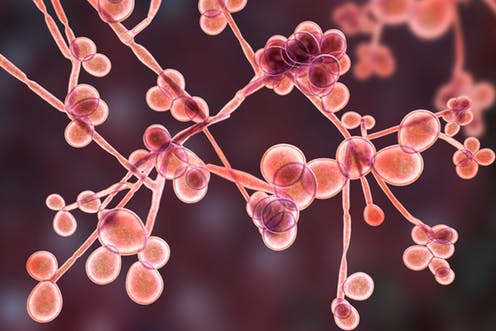Experts Warn That Climate Change Would Unlock New Microbes And Increase Heat-Related Deaths
Source: Thailand Medical News Jan 24, 2020 6 years, 1 month, 3 days, 9 hours, 10 minutes ago
An alarming article by Johns Hopkins University School of Medicine Professors published recently in The Journal of Clinical Investigation (JCI) warn that global
climate change is likely to unlock dangerous new
microbes, as well as threaten humans' ability to regulate body temperature.
 Candida auris-a new microbe
Candida auris-a new microbe
All of the Johns Hopkins Bloomberg Distinguished Professors including Dr Rexford Ahima, M.D., Ph.D., and Dr Arturo Casadevall, M.D., Ph.D., M.S., along with Dr William Dietz, M.D., Ph.D., director of the George Washington University's Sumner M. Redstone Global Center for Prevention and Wellness, and Dr Susan Pacheco, M.D., associate professor in the Department of Pediatrics at the University of Texas Health Science Center at Houston, authored journal articles relevant to their fields that detail how rising temperatures around the world pose dangerous threats to humanity.
Dr Ahima, director of Johns Hopkins' Division of Endocrinology, Diabetes and Metabolism, wrote in the journal that "global warming threatens human
thermoregulation and survival."
Dr Ahima explains that people generate body heat and have the capacity to regulate their temperature within a few degrees. But "as heat waves become more common, more severe, and longer, we expect to see more heat-related illnesses and deaths," he writes.
Dr Ahima cites a recent study that examined global heat-related mortality, pointing out that tropical and subtropical countries and regions will experience the sharpest surge in illness and death stemming from higher temperatures, while the United States and Europe can also expect increases.
Dr Casadevall's article explores "the specter of new infectious diseases" as a result of the changing climate.
The professor of molecular microbiology and immunology, and infectious diseases, at Johns Hopkins' schools of medicine and public health told
Thailand Medical News, "Given that
microbes can adapt to higher temperatures, there is concern that global warming will select for
microbes with higher heat tolerance that can defeat our
endothermy defenses and bring new infectious diseases."
The process of
Endothermy allows humans and other warm-blooded mammals to maintain high temperatures that can protect against infectious diseases by inhibiting many types of
microbes.
Dr Casadevall cites a particular climate threat from the fungal kingdom. "We have proposed that global warming will lead many fungal species to adapt to higher temperatures," he writes, "and some with pathogenic potential for humans will break through the defensive barrier provided by
endothermy."
Dr Casadevall points to the rise of
;>Candida auris, a species of fungus identified in 2009 and called a "catastrophic threat" by the U.S. Centers for Disease Control and Prevention in 2017.
He added, "The nearly simultaneous emergence of
Candida auris on three continents, an event proposed to result from global warming, has raised the specter that increased warmth by itself will trigger adaptations on certain
microbes to make them pathogenic for humans."
Dr Casadevall says that, while fungi present the most immediate threat, other
microbes also adapt to evolving conditions such as temperature. He writes that "the conceptual threat originally identified with fungi, and exemplified by
C. auris as the canary in the coal mine, applies across the microbial world."
Dr Dietz's article addresses
climate change and malnutrition, calling obesity, undernutrition and
climate change a "syndemic," or multiple epidemics that interact and share common underlying social or economic determinants and policy drivers. In her article, Pacheco discusses climate change's adverse consequences regarding pregnancy and maternal, fetal and child health.
All four JCI "Viewpoint" articles,advocate long-term strategies to reduce greenhouse gas emissions and slow the trend of rising temperatures.
References :
Rexford S. Ahima, Global warming threatens human thermoregulation and survival, Journal of Clinical Investigation (2020). DOI: 10.1172/JCI135006
Susan E. Pacheco. Catastrophic effects of climate change on children's health start before birth, Journal of Clinical Investigation (2020). DOI: 10.1172/JCI135005
William H. Dietz. Climate change and malnutrition: we need to act now, Journal of Clinical Investigation (2020). DOI: 10.1172/JCI135004
Arturo Casadevall. Climate change brings the specter of new infectious diseases, Journal of Clinical Investigation (2020). DOI: 10.1172/JCI135003
